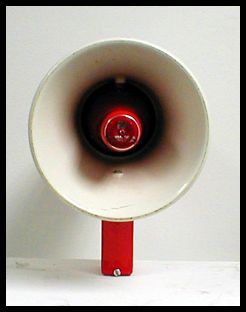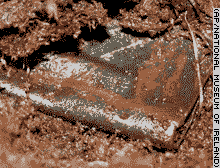
James 4:1 (New Living Translation)
“What is causing the quarrels and fights among you? Isn't it the whole army of evil desires at war within you?”
The war in the Middle-East has taken an ugly turn, as wars always do. It’s what almost inevitably happens when diplomacy and statecraft fail.
It’s quite easy to view the carnage and self-righteously declare that the whole thing could have been avoided. Well, of course it could have been, in the same manner that any war in history could have been avoided. What’s more, it’s even easier to vilify the actor in this morality play who has responded to the provocation to begin with.
One of the things that’s struck me over the past few days is that if anyone wonders how these conflicts begin with all they need to do is take a trip on the good ship Blogosphere. Once they get their ticket and get on board they’ll see how the wars of words all too often become shooting wars.
Ever since this conflict began I’ve been reading MidEastWeb, a blog moderated by Ami Isseroff, an Israeli peace activist. I’ve never met him, so what little I know of him is through the written word. He seems to me to be an eminently decent man. If I’m to believe what I read about him he’s dedicated much of his life to pursuing peace between Israel and her neighbors.
The thing that has set him apart in this conflict, though, is that he has supported Israel’s right to defend its territorial integrity. That position has, unfortunately, cost him.
How is it that a man of peace is now vilified by some former allies and viewed as a man of war, even a supporter of Israeli sponsored terror?
One of the things that’s quite clear to me about the Middle-East is more complex than we living in the safety of the free world could possibly imagine. I think, given that, men like Ami Isseroff are as complex as problems that now seem so intractable. A couple of years ago I read Eliot Cohen’s “Supreme Command.” In the book, Cohen looked at leadership in times of crisis. Among the leaders he greatly admired was David Ben-Gurion. In the fifth chapter he described the one-floor bungalow that Ben-Gurion retired to in 1963. There adorning the walls were four images that summed up, in Cohen’s mind, the complexity and greatness of the man. On his desk was a picture of Berl Katznelson. On a wall opposite the desk was a replica of Michelangelo’s Moses. In the living room there was a portrait of Abraham Lincoln. In the bedroom there was a picture of Mahatma Gandhi.
As Cohen noted:
“These four images capture much of the complexity of Ben-Gurion’s personality – Katznelson, his immersion in the fierce internecine struggles of labor with political rivals outside it; Moses, his roots in Jewish history and identity and his messianic aspirations for the Jewish people; Lincoln, his admiration for the English-speaking world and its greatest leaders in their most bitter contests for freedom and democratic rule; Gandhi, his appreciation of spiritual power even when its expression took form so completely different from his own. His own greatness resided, in great measure, in his ability to harmonize these contrasting and in some respects contradictory sides of his personality.” (Pages 133-134)
Am I saying that Ami Isseroff is a great man? It’s not for me to say, but I can say that he is a complex man and that I believe much of that complexity if founded on the twists and turns of Israel’s modern history. All he’s trying to do is harmonize the same contradictory elements of the Middle-East drama that are at the core of his life.
In a recent post Ami called the current war a “generic war,” he attempted to unravel some of the complexity, looking at the current conflict from both sides. It was well thought out, well written, and often compelling. He concluded the essay with these words:
“Unless these groups (Hezbollah and Hamas) are stopped, there is no chance that moderate forces will be empowered in Middle East. Their success, and the international legitimacy that is granted to them, will be the inspiration for similar tactics all over the Middle East, and will lead to many more “generic wars.” However, it appears increasingly doubtful that Israel alone can stop the Hezbollah. Stopping the Hezbollah requires a determined international effort.”
It all seemed very reasonable to me. Yet, one of the things I found surprising when I went back to the post a day after it was published was the level of vitriol aimed at him. One commenter, whose pen name is Sirocco, had this to say:
“I am dismayed that Ami Isseroff, whom I used to respect, appears to support this despicable campaign of war crime against the people of Lebanon.”
“Well, it suddenly makes more sense that he links to the likes of Little Green Footballs. My own link to him is now removed.”
Another who calls himself Frederick said this:
“Sirocco is right. Ami used to be a intelligent person (my emphasis added), but he's now been reduced to sprouting the crudest of cliches. The prisoners' document show that Hamas is least moving toward a 2-state solution. What is the Olmert government doing to promote the creation of a sovereign Palestinian state? By placing a separation barrier in the heart of Palestinian communities, by annexing the Jordan Valley, by creating a Jewish belt around East Jerusalem, the Olmert government is making a Palestinian state an impossibility.”
About fifteen minutes later he said this:
“And, one more thing, Ami: It was precisely because Hamas was moving towards a 2-state solution that Israel reinvaded Gaza, just as Israel invaded Lebanon in 1982 to forestall a more moderate approach by the PLO.”
“But this is all irrelevant to Ami, who's become the Benny Morris (my emphasis added) of bloggers.”
Then, about twenty minutes after that he added this final salvo:
“Notice that Ami does not mention the violations committed by Israel against the Lebanon's sovereignty since 2000 -continuous over-flights into Lebanese air space, kidnapping of Lebanese nationals, refusal to provide maps of location of land mines.”
Later that day someone who identified himself as “OMFG” added the following insult to injury:
“I'm appalled by your comments. Don’t you people know that disagreeing with an Israeli is “ANTI-SEMITISM”!!! I hate this word, all it stands for is. “I'm a Jew I should be able to commit what ever dirty, ruthless crime there is ..and if you disagree then your an evil person for not letting me have my way...whaaaaaa!”. Israelis can hide behind their little mantra that they live in hell and all the boogey-men Arabs are out to get them. That doesn't make what your government does ok. Just as you want to be treated as individuals and not be judged by the actions of your extremist government, so too should you give the same respect to the citizens of your neighboring countries. Your double standards are not obscured. We all see what values and morals you hold. Those values will be your undoing.”
After reading the comments I went back to the original post to see, based on the comment thread, what I’d missed. Try as I might I couldn’t find anything in the piece in which Mr. Isseroff said or alluded to the notion that anyone who disagreed with him was an anti-Semite. I found nothing in the piece either advocated or supported war crimes. Yet, this was the conclusion some commenters came to. The more I thought about it all, the more I came to see that this was a classic case of asking for Betty Gabriel and getting Frankenstein. Ami Isseroff was asking for understanding and got overheated rhetoric in return. The hate was palpable; if the commenters, men of peace to a man, only could have gotten their hands on his throat they would have shown him what peace was all about. That’s how wars begin, that’s the core of this war, and that’s how the blogosphere is becoming an extension of the conflict.
You see, the blogosphere is just one more piece of this enormously complex problem. It’s war being waged on an electronic battlefield, with ad-hominems and distortions as the primary weapons.
Technorati tags for this post:
Hezbollah
Israel












